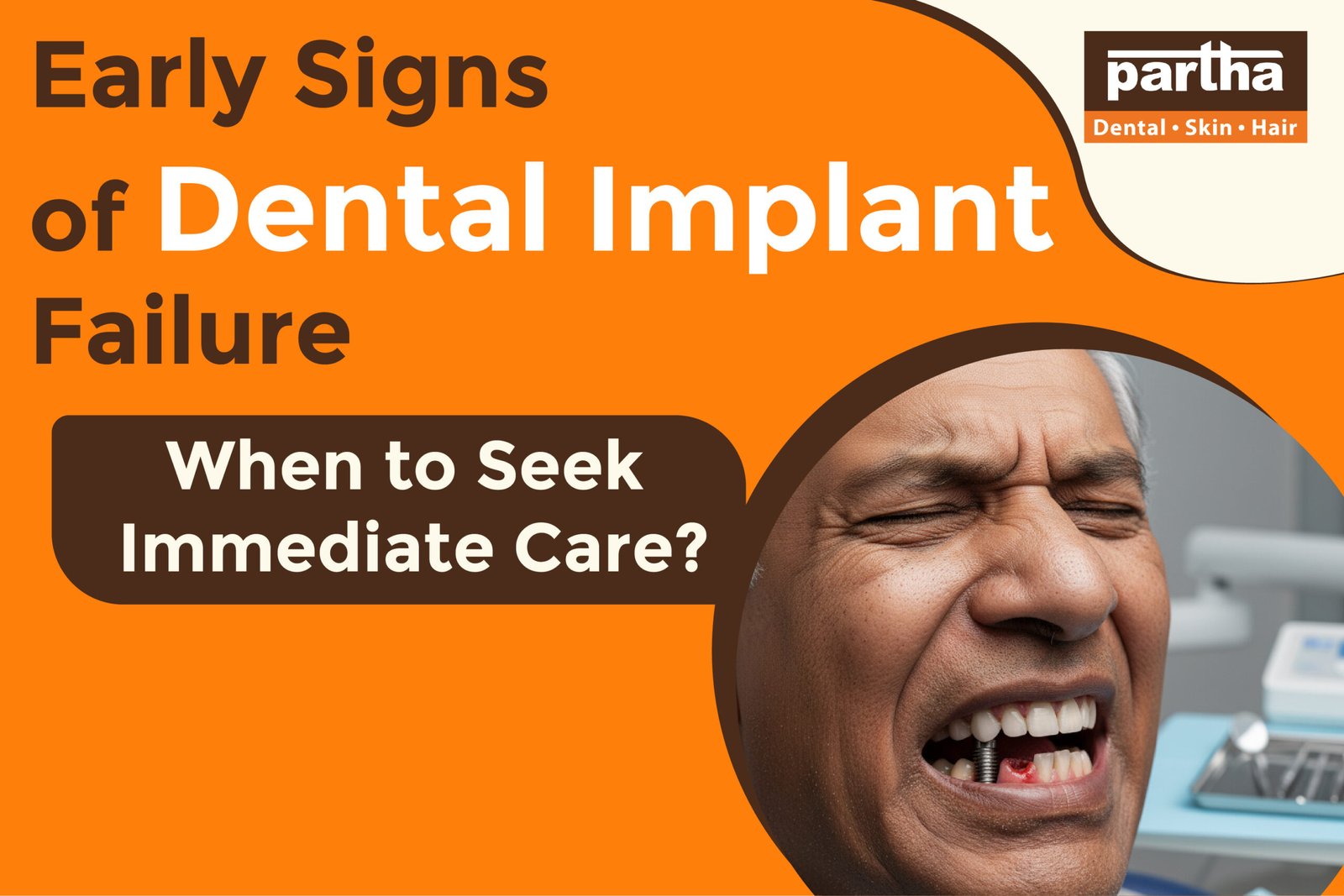Table of Contents
You’ve just had your dental implant placed, your smile feels brighter, chewing is easier, and let’s be honest, you might be showing it off a little (and why not? It really does look that good!).
Dental implants are basically the hidden champions of dentistry.
They can do so much more than just fill in gaps; they protect your jaw bone, including your bite forces, and they restore your confidence.
But there is a catch-even champions have vulnerabilities. Dental implants are durable, but nothing is indestructible.
They can fail. Right? Yes, it does happen.
The good news is that if we can learn to recognize the early signs ofdental implant failure, we may be able to intervene early and save the day and keep your smile happy!
So let’s get started playfully, but seriously as your teeth deserve facts and fun!
1. What Is Dental Implant Failure?
A dental implant should last years even decades but sometimes the body just won’t cooperate, and dental implant failure means your implant is unable to properly integrate with your jawbone or has experienced complications after placement.
Most of the time this does not mean the end of your implant journey it just means your implant might need a little extra TLC (Tender Loving Care or in this case, Tender Loving Correction).
2. Common Reasons for Dental Implant Failures
Before we discuss the signs, let’s explore the “why.”
Even Sherlock Holmes needed clues to figure out the mystery!
Sometimes it’s easy to understand why all implants go flawlessly – but there are a variety of reasons why things may not go according to plan.
Here are the most common reasons for dental implant complications:
1. Poor Osseointegration
This is a big word!Osseo integration refers to when your implant fuses to the jawbone, and if it’s not fused well, it will remain loose like building a house on sand.
2. Infections (Peri-Implantitis)
A bacteria invasion is sometimes the cause. An infection surrounding the implant can cause inflammation, bone loss and ultimately failure.
3. Overloading the Implant
Getting too excited and putting your “super-biting powers” to the test (hello crunchy apples and sticky candy!) can overload the implant too soon.
4. Poor Oral Hygiene
Implants don’t get cavities, but your gums and surrounding tissues do need to be cleaned! Ignoring the oral hygiene around the implant can cause gum disease and could really mean the end of the implant.
5. Smoking and Health Issues
Smoking is bad for causing healing issues (bad for implants). Health issues like diabetes, immune disorders, and osteoporosis can approx. increase the risks.
Book your FREE consultation3. Don’t Ignore These Early Dental Implant Failure Signs
While your implant won’t give you the big thumbs down, it will offer small hints and clues.
In fact, catching these dental implant failure signs early is important to prevent unnecessary complications:
1.Pain That Doesn’t Stop: Some pain after surgery is expected. However, if it lasts and seems to get worse, then it should be evaluated.
2. Swelling That Doesn’t Go Down: Swelling is expected after dental surgery. Just pay attention. Peripheral edema that sticks around like your college roommate after graduation should make you nervous.
3. Loose Implant: An implant should feel stable and solid, just like a natural tooth. If it has any wiggle to it, it is waving a huge red flag.
4. Gum Recession or Gum Problems: If the gums around the implant have receded, or if the gums around the implant appear dark and inflamed, this could represent infection.
5. Trouble Chewing: If you wince every time you bite into some mashed potatoes, your implant might not be that happy.
Think of it like this: If your implant feels “off” in any way, it is better to be safe than sorry and pay close attention to it. Your mouth knows best.
When Should You See Care Specifically for Your Implant?
Consider this scenario: you discover an implant is loose, or you have pus around your gums! Should you wait this one out? No dice. This isn’t the appropriate circumstance for DIY or getting Google on the case. You should seek immediate care if you notice:
- Bleeding or pus at the site of the implant
- Extreme discomfort that no medication can desecrate
- Sudden swelling in the face & or swelling in the gums
- A visibly moving implant.
Postponing treatment can only make matters worse, and may even lead to the permanent failure of your dental implant. The earlier a professional can see you, the greater the opportunity to save your implant.
4. Dental Implant Failure Treatment Options
So, if dental implant failure is diagnosed, what can be done?
Do not stress. There are many dental implant failure treatment options, depending upon the issue, which may include:
1. Deep Clean & Medication
If it is indeed an infection, antibiotics and sometimes a professional cleaning may save the implant.
2. Bone Grafting
If the implant has not fused due to some bone loss, a graft may build up the area again, giving your implant a second chance.
3. Replacing the Implant
If the implant is unsalvageable, it may be removed and replaced, thinking of it as simply pressing “restart” after healing.
4. Laser Therapy
The evolving techniques using lasers can help reduce bacteria and enhance healing, as well as healing around the implant.
At Partha Dental, we like to think of this as the “rehab” stage for your implant. The objective? Get everything back to performance mode for your implant.
How to Fix Dental Implant Failure: Prevention and Care
The reality is that prevention is better than cure. So, how do you fix dental implant failure before it happens?
Here are a few ways to help you prevent the failure of dental implants before it happens:
Maintain Good Oral Hygiene: Brush, floss and rinse after every meal. Your gums will love you for it.
Visiting Your General Dentist: Consistently visit your dentist, and have them take a look at your implant every now and then (in other words, “implant wellness check”).
Do not Smoking: No, seriously, you know how awful smoking is for you, and implants certainly want to stay away from smoking for sure.
Eating Habits: Take it easy and enjoy a soft diet while healing; avoid hard and sticky things as they can overload the implant.
Health Issues: You should work closely with your doctor to help manage diabetes, osteoporosis and any other health issues you may have.
With the proper maintenance and care your implant may last for decades – and still be Instagram ready!
While dental implant failure can sound intimidating, if you understand the causes of dental implant failure, notice the signs of dental implant failure early, and access dental implant failure treatment on time, your outcome will be favorable.
And remember: if it feels “weird” – don’t wait! The team at Partha Dental is happy to step in, diagnose, fix, and get you back on track.
So keep smiling, keep chewing, make sure your implants are happy for life! Call us now- 04041420000to book a consultation today!!
5. FAQs
Dental implant failures are not common. Research reports success rates for dental implants of over 10-95%, and although failure may occur, it is often the result of healing issues, infections, or bone defects
Yes! It is often treatable and will depend on the reason for failure, it can be managed by cleaning, medications, a bone graft, or replacing the implant.
Early failure symptoms can show up fairly quickly – 3 to 6 months after placement. Late failure can occur much later, and usually from a subsequent infection or bone loss.
Not necessarily, in fact, some normal post-operative discomfort is to be expected. However, if you are experiencing persistent pain, or significant pain, these are weak signals that should not be ignored.
Brush at least twice a day, floss, and have regular dental check-ups. Avoid smoking and don’t overload your implant with hard things in the first few weeks after placement. Read more
Dental Questions? We’re here to help!
Disclaimer:
The prices mentioned in this blog are indicative and may vary based on the severity of the condition, technology used, and materials suggested by the Dentist. They are accurate as of the date of publishing and subject to change as per clinic policy. Third-party or AI-generated estimates may not reflect actual clinic pricing. For accurate costs, please visit your nearest Partha Dental clinic.




